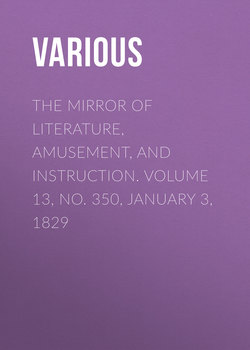Читать книгу The Mirror of Literature, Amusement, and Instruction. Volume 13, No. 350, January 3, 1829 - Various - Страница 6
BRUCE CASTLE, TOTTENHAM
THE POET, CHATTERTON
Оглавление(To the Editor of the Mirror.)
Should the following notice of Chatterton, which I copy from a small handkerchief in my possession, be thought worthy of a place in the MIRROR, you will oblige me by inserting it. The handkerchief has been in my possession about twenty-five years, and was probably printed soon after the poet's death; he is represented sitting at a table, writing, in a miserable apartment; behind him the bed turned up, &c.
SUFFOLK.
The Distressed Poet, or a true representation of the unfortunate Chatterton.
The painting from which the engraving was taken of the distressed poet, was the work of a friend of the unfortunate Chatterton. This friend drew him in the situation in which he is represented in this plate. Anxieties and cares had advanced his life, and given him an older look than was suited to his age. The sorry apartment portrayed in the print, the folded bed, the broken utensil below it, the bottle, the farthing candle, and the disorderly raiment of the bard, are not inventions of fancy. They were realities; and a satire upon an age and a nation of which generosity is doubtless a conspicuous characteristic. But poor Chatterton was born under a bad star: his passions were too impetuous, and in a distracted moment he deprived himself of an existence, which his genius, and the fostering care of the public would undoubtedly have rendered comfortable and happy. Unknown and miserable while alive, he now calls forth curiosity and attention. Men of wit and learning employ themselves to celebrate his talents, and to express their approbation of his writings. Hard indeed was his fate, born to adorn the times in which he lived, yet compelled to fall a victim to pride and poverty! His destiny, cruel as it was, gives a charm to his verses; and while the bright thought excites admiration, the recollection of his miseries awakens a tender sympathy and sorrow. Who would not wish that he had been so fortunate as to relieve a fellow creature so accomplished, from wretchedness, despair, and suicide?
WRITTEN ON VIEWING THE PORTRAIT OF CHATTERTON
Ah! what a contrast in that face portray'd,
Where care and study cast alternate shade;
But view it well, and ask thy heart the cause,
Then chide, with honest warmth, that cold applause
Which counteracts the fostering breath of praise,
And shades with cypress the young poet's bays:
Pale and dejected, mark, how genius strives
With poverty, and mark, how well it thrives;
The shabby cov'ring of the gentle bard,
Regard it well, 'tis worthy thy regard,
The friendly cobweb, serving for a screen,
The chair, a part of what it once had been;
The bed, whereon th' unhappy victim slept
And oft unseen, in silent anguish, wept,
Or spent in dear delusive dreams, the night,
To wake, next morning, but to curse the light,
Too deep distress the artist's hand reveals;
But like a friend's the black'ning deed conceals;
Thus justice, to mild complacency bends,
And candour, all harsh influence, suspends.
Enthron'd, supreme in judgment, mercy sits,
And, in one breath condemns, applauds, acquits:
Whoe'er thou art, that shalt this face survey,
And turn, with cold disgust, thine eyes away.
Then bless thyself, that sloth and ignorance bred
Thee up in safety, and with plenty fed,
Peace to thy mem'ry! may the sable plume
Of dulness, round thy forehead ever bloom;
May'st thou, nor can I wish a greater curse;
Live full despis'd, and die without a nurse;
Or, if same wither'd hag, for sake of hire,
Should wash thy sheets, and cleanse thee from the mire,
Let her, when hunger peevishly demands
The dainty morsel from her barb'rous hands,
Insult, with hellish mirth, thy craving maw
And snatch it to herself, and call it law,
Till pinching famine waste thee to the bone
And break, at last, that solid heart of stone.
